A scientific instrument is a device or tool used for scientific purposes, including the study of both natural phenomena and theoretical research.
LECO Corporation, founded in 1936 by Carl Schultz and George Krasl, operates its analytical instrumentation research and development, and manufacturing from its headquarters located in St. Joseph, Michigan. LECO develops and manufactures elemental measurement and molecular Time-of-flight mass spectrometry instrumentation, following ISO 9000 standards. The LECO trademark is an acronym of the original name, Laboratory Equipment Corporation. One of LECO's early products was a combustion analyzer invented by Krasl in 1957 that used crucibles invented by his employee Eugene Bennet.,

Henry Cary was an American engineer and the co-founder of the Applied Physics Corporation, along with George W. Downs and William Miller. The Cary 14 UV-Vis-NIR and the Cary Model 81 Raman Spectrophotometer were particularly important contributions in scientific instrumentation and spectroscopy. Before starting Applied Physics, Cary was employed by Beckman Instruments, where he worked on the design of several instruments including the ubiquitous DU spectrophotometer. Howard Cary was a founder and the first president of the Optical Society of Southern California.
Combustion analysis is a method used in both organic chemistry and analytical chemistry to determine the elemental composition of a pure organic compound by combusting the sample under conditions where the resulting combustion products can be quantitatively analyzed. Once the number of moles of each combustion product has been determined the empirical formula or a partial empirical formula of the original compound can be calculated.

Bruker Corporation is an American manufacturer of scientific instruments for molecular and materials research, as well as for industrial and applied analysis. It is headquartered in Billerica, Massachusetts, and is the publicly traded parent company of Bruker Scientific Instruments and Bruker Energy & Supercon Technologies (BEST) divisions.

JEOL, Ltd. is a major developer and manufacturer of electron microscopes and other scientific instruments, industrial equipment and medical equipment.

Rigaku Corporation is an international manufacturer and distributor of scientific, analytical and industrial instrumentation specializing in X-ray related technologies, including X-ray crystallography, X-ray diffraction (XRD), X-ray reflectivity, X-ray fluorescence (XRF), automation, cryogenics and X-ray optics.

David E. Clemmer is an analytical chemist and the Distinguished Professor and Robert and Marjorie Mann Chair of Chemistry at Indiana University in Bloomington, Indiana, where he leads the Clemmer Group. Clemmer develops new scientific instruments for ion mobility mass spectrometry (IMS/MS), including the first instrument for nested ion-mobility time-of-flight mass spectrometry. He has received a number of awards, including the Biemann Medal in 2006 "for his pioneering contributions to the integration of ion mobility separations with a variety of mass spectrometry technologies."
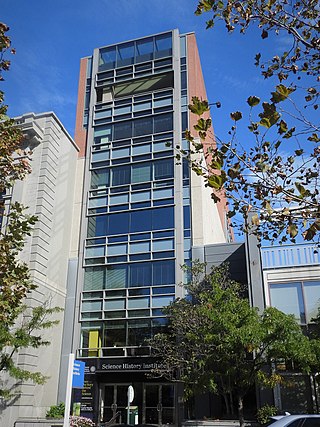
The Science History Institute is an institution that preserves and promotes understanding of the history of science. Located in Philadelphia, Pennsylvania, it includes a library, museum, archive, research center and conference center.
Pittcon Editors’ Awards honoured the best new products on show at the Pittsburgh Conference on Analytical Chemistry and Applied Spectroscopy, or Pittcon, for 20 years from 1996 having been established by Dr Gordon Wilkinson, managing editor of Analytical Instrument Industry Report. On 8 March 2015, the event returned to the Morial Convention Center in New Orleans and this was the last occasion when the awards were presented.
Silver Beach County Park is a park located in St. Joseph, Michigan at the mouth of the St. Joseph River. It was formerly Silver Beach Amusement Park, an amusement park, which operated between 1891 and 1971.
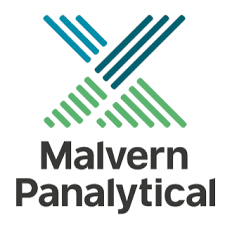
Malvern Panalytical is a Spectris plc company. The company is a manufacturer and supplier of laboratory analytical instruments. It has been influential in the development of the Malvern Correlator, and it remains notable for its work in the advancement of particle sizing technology. The company produces technology for materials analysis and principal instruments designed to measure the size, shape and charge of particles. Additional areas of development include equipment for rheology measurements, chemical imaging and chromatography. In 2017, they merged with PANalytical to form Malvern Panalytical Ltd.

Polymer Char is a company which designs and manufactures instrumentation for polymer analysis.
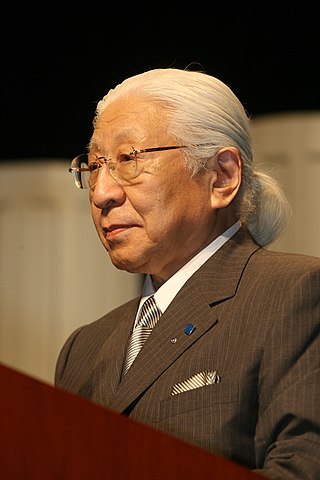
Masao Horiba was a Japanese businessman. In 1945, he founded Horiba Radio Laboratory, now Horiba Ltd., a manufacturer of advanced analytical and measurement technology. Masao Horiba received several awards from the Japanese government including a national Blue Ribbon Medal, and was the first non-American to receive the Pittcon Heritage Award.

The Pittcon Heritage Award recognizes "outstanding individuals whose entrepreneurial careers shaped the instrumentation and laboratory supplies community." The award is jointly sponsored by the Pittsburgh Conference on Analytical Chemistry and Applied Spectroscopy (Pittcon) and the Science History Institute. The award is presented annually at a special ceremony during Pittcon.

Arthur 'Blaine' Bowman is a leading proponent of ion chromatography, who has served variously as chairman, president, chief executive officer, and director of Dionex Corporation, a manufacturer of analytical instruments. Bowman received the 2015 Pittcon Heritage Award in recognition of his contributions to the field of ion chromatography.
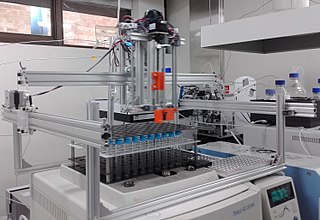
An autosampler is commonly a device that is coupled to an analytical instrument providing samples periodically for analysis. An autosampler can also be understood as a device that collects samples periodically from a large sample source, like the atmosphere or a lake, for example.
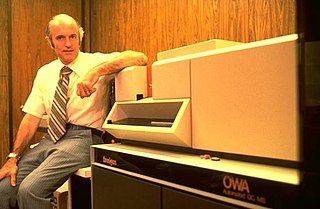
Robert Emmet Finnigan was an American pioneer in the development of gas chromatography–mass spectrometry equipment (GC/MS). Finnigan founded the Scientific Instruments Division of Electronic Associates, Inc., producing the first commercial quadrupole mass spectrometer in 1964. He then formed Finnigan Instruments Corporation to combine a computer system with a quadrupole mass spectrometer and gas chromatograph. Finnigan's GC/MS/computer systems are used to detect and identify trace organic compounds, making them important instruments for the monitoring and protection of the environment. They were adopted by the United States Environmental Protection Agency as a standard instrument for monitoring water quality and were fundamental to the work of the EPA.
Wyatt Technology Corporation, or Wyatt Technology, is a developer and manufacturer of instrumentation for the characterization of nanoparticles and macromolecules. Headquartered in Santa Barbara, California, Wyatt Technology was founded in 1981 and incorporated in 1984. Wyatt Technology has developed and introduced instrumentation for the measurement of multiangle light scattering (MALS), quasi-elastic light scattering (QELS), differential refractive index, electrophoresis, viscosity, and composition gradient multiangle light scattering (CG-MALS) for the determination of absolute molecular weights, sizes of nanoparticles, proteins, and polymers within a solution.
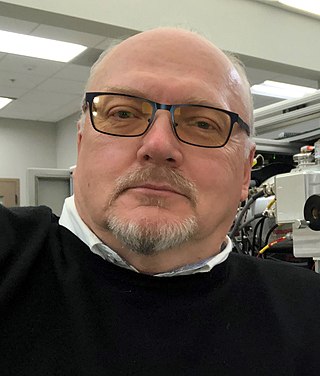
Viatcheslav (“Slava”) Borisovich Artaev is a Russian-American physicist who studies Mass Spectrometry technology. He currently works as the Technical Director for Research and Development of the Separation Science Division for LECO Corporation based in Saint Joseph, Michigan, USA.:














